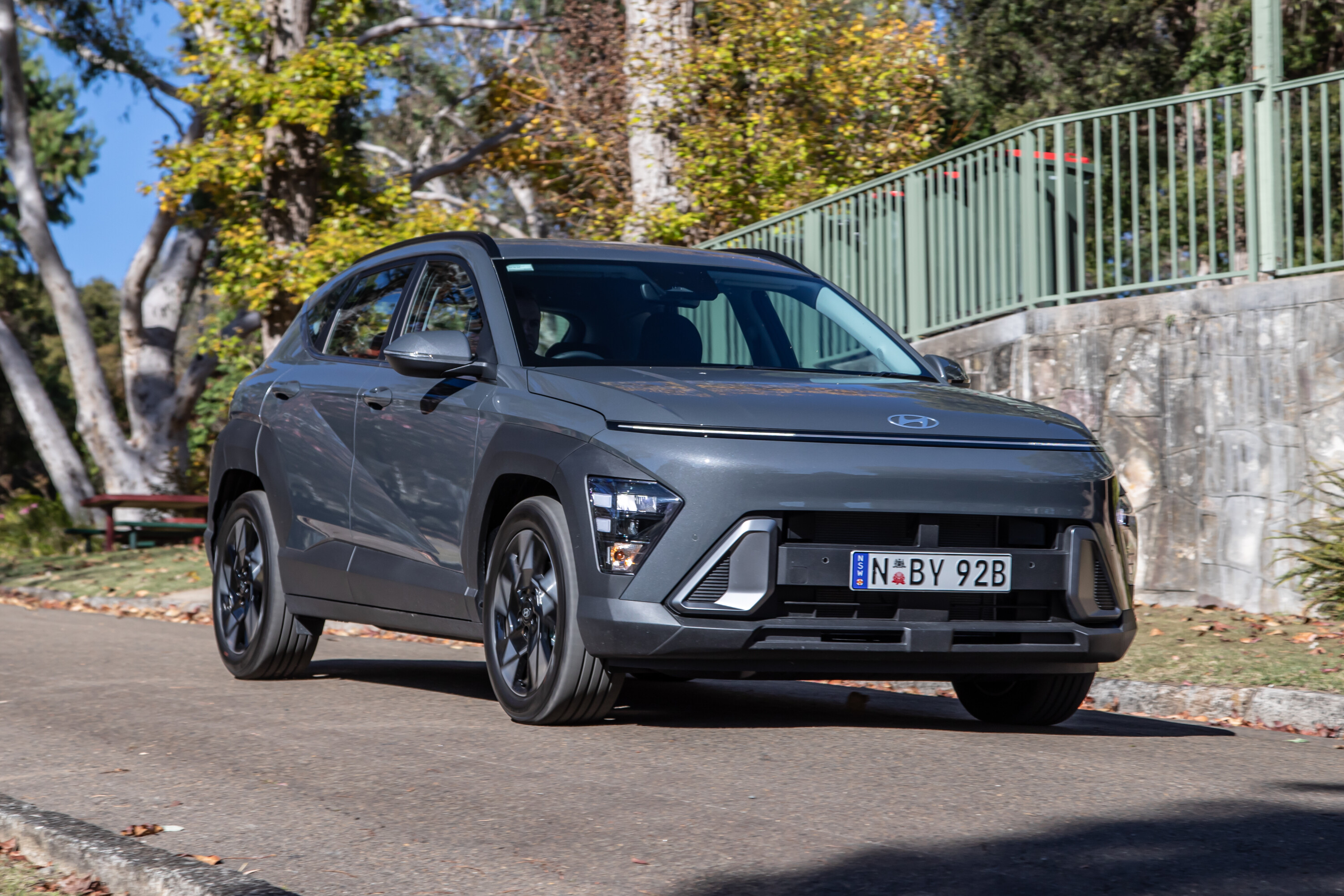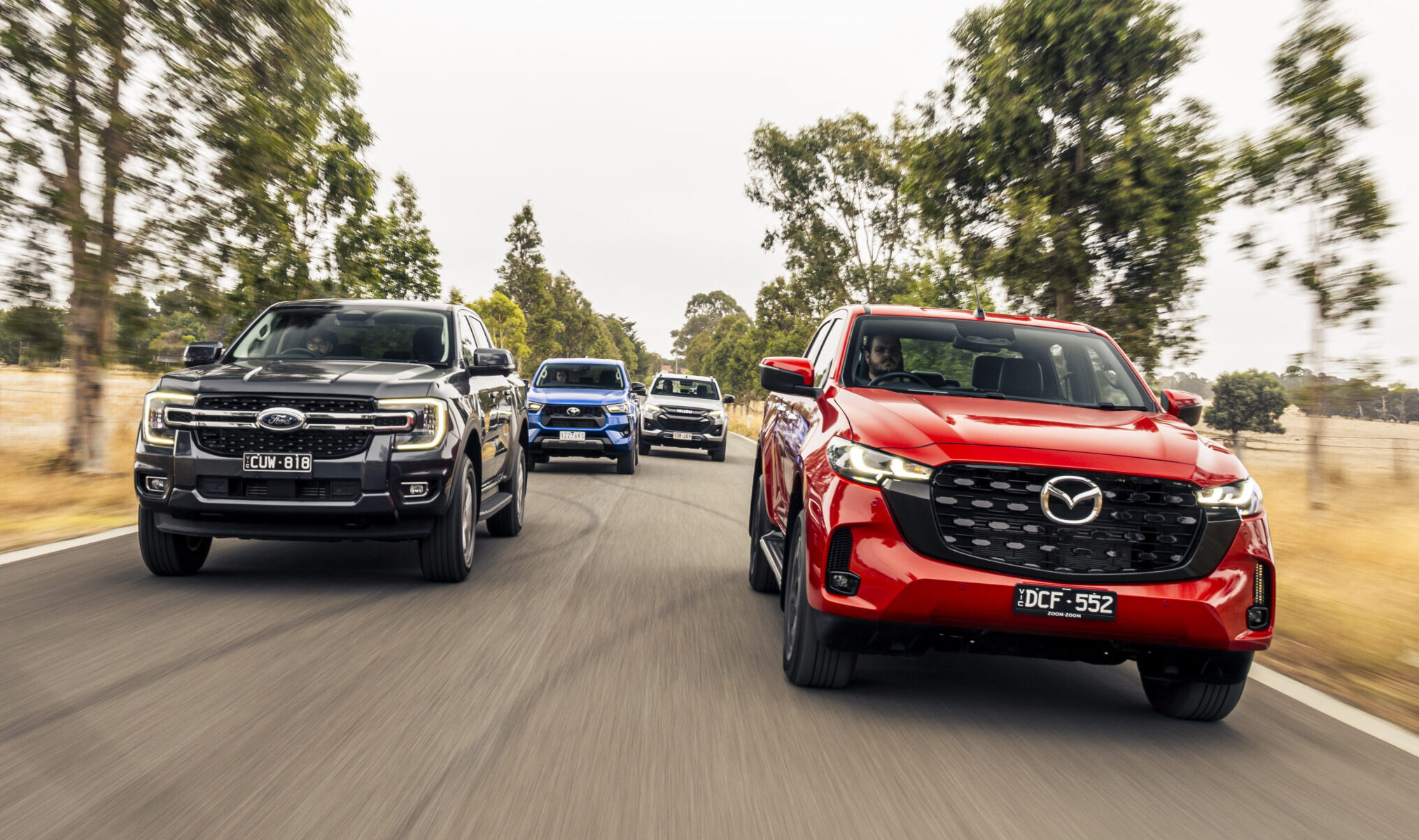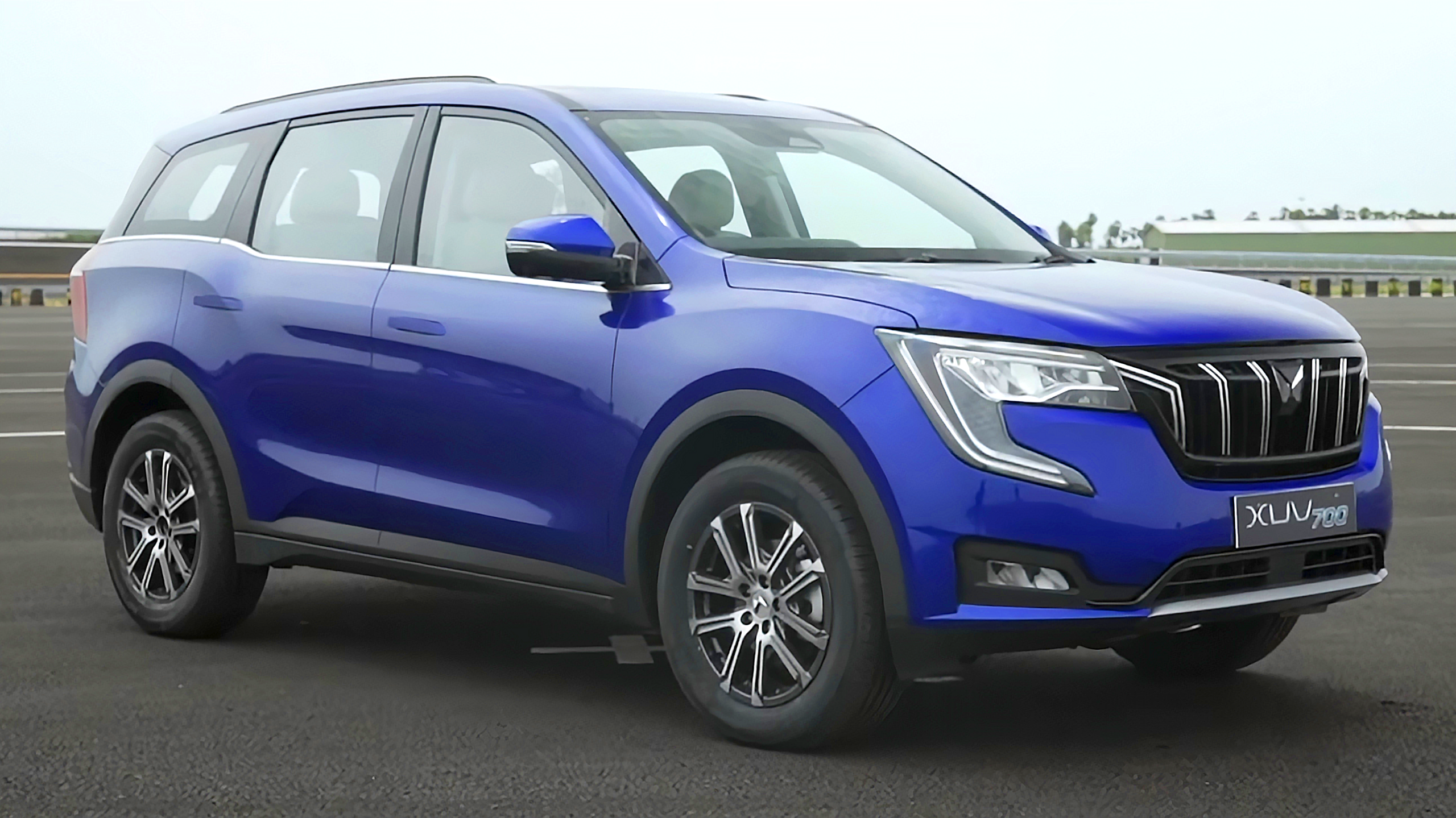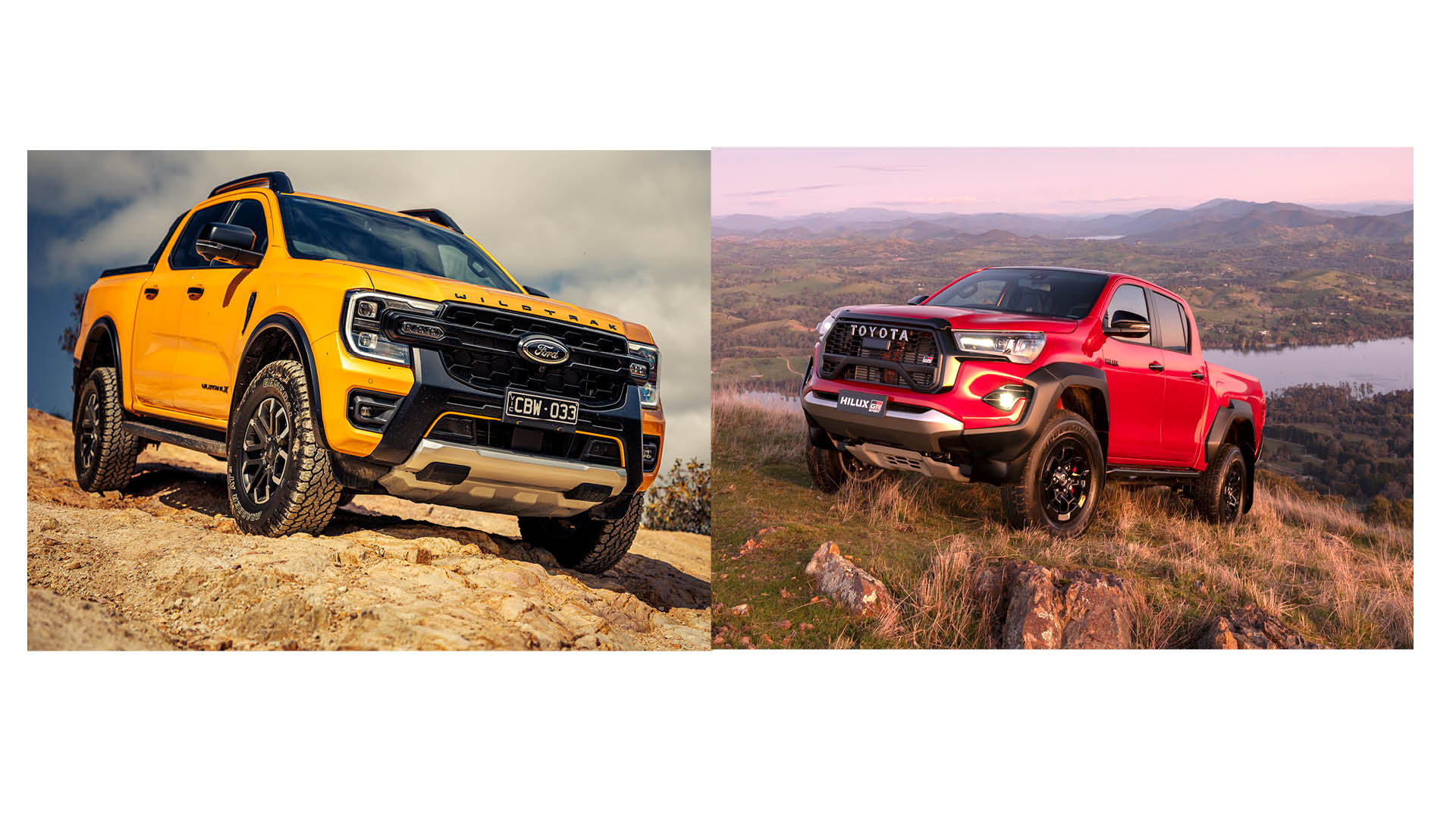Score breakdown
Things we like
- Cool looks inside and out
- Equipment level
- So much more space
Not so much
- Sometimes fidgety rear ride
- Ho-hum drivetrain
- Price increase
Before now, Hyundai’s smash-hit Kona was like so many small SUVs before and after it – ‘we need to get something out, because dealers are screaming for them’.
Things are obviously never that simple, but the Korean giant took the well-worn path of grabbing a hatchback platform, jacking it up and pitching it into battle with more guesswork than usual because the segment was new. Hyundai also did something unusual with the method, slapping on a Citroen Cactus-inspired front end that made the car unforgettable.
So much has changed since this car first arrived and the success of the first one must have weighed heavily on the team. But they’re a confident bunch at Hyundai and armed with a ton more data from their own customers – and from their competitors’ customers – the second-generation Kona was born.
JUMP AHEAD
- How much is it, and what do you get?
- How do rivals compare on value?
- Interior comfort, space and storage
- What is it like to drive?
- How much fuel does it use?
- How safe is it?
- Warranty and running costs
- VERDICT
- Specifications
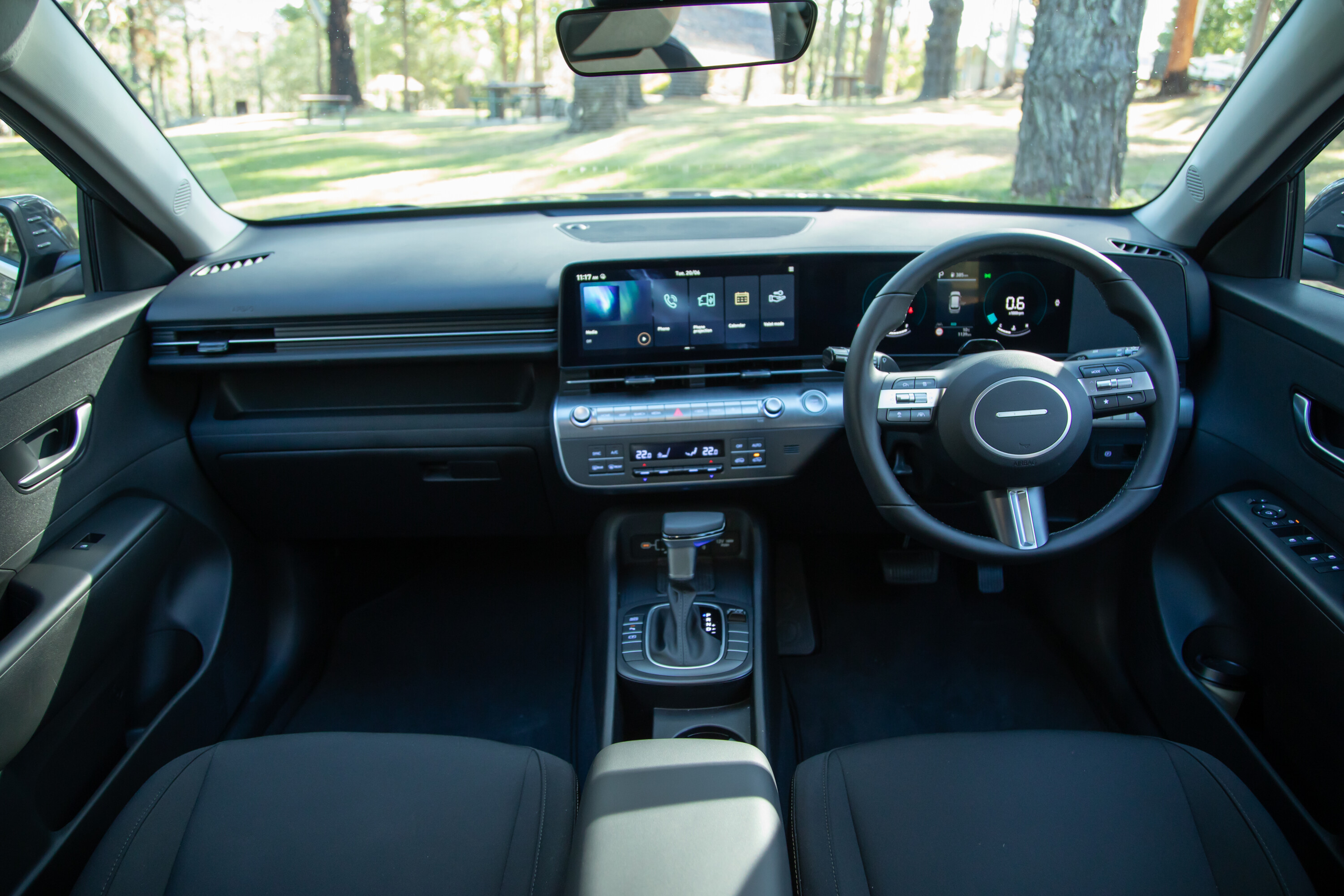
How much is it, and what do you get?
The new entry-level Kona – I hesitate to use the word base model – now starts at a rather more hefty $32,000 before on-road costs.
A lot more standard equipment comes in this car than the previous Kona Active – not to mention the fact it’s physically a lot more car.
| 2024 Hyundai Kona standard features | |
|---|---|
| 18-inch alloy wheels | Keyless entry and start |
| 12.3-inch touchscreen | LED headlights, tail-lights and DRLs |
| Wireless Apple CarPlay and Android Auto | LED cabin lighting |
| Hyundai Bluelink connected-car service | Dual-zone climate control with rear vents |
| Over-the-air remote software updates | Rear-centre fold-down armrest |
| DAB+ digital radio | Remote start |
| Six-speaker audio system | Heated, auto-folding side mirrors |
| 4.2-inch semi-digital instrument cluster | Front and rear parking sensors |
| USB-C charge ports (3x front, 2x rear) | Manual height-adjustable driveru2019s seat with two-position power lumbar support |
| 15-watt wireless phone charger | Manual height-adjustable passenger seat |
| Black cloth upholstery | Tyre pressure monitoring |
| Leather-wrapped steering wheel and gear shifter | Roof rails. |
There’s a lot more gear in this car than the previous iteration, which partly explains the hefty price rise.
Its new 12.3-inch screen is terrific and, as before, the lower-end car has wireless Apple CarPlay and Android Auto in line with other Hyundais that don’t have in-built sat-nav.
LED headlights are another notable addition and while the dashboard is listed as semi-digital, it does a convincing impression of a fully digital display.
How do rivals compare on value?
The new Kona’s arrival changes things – before you could argue cars like the C-HR were more appropriate rivals. Not anymore.
Starting with the Toyota theme, the Corolla Cross is one of the Kona’s stronger rivals. The problem with that car is that you almost certainly wouldn’t bother with a non-hybrid because they’re quite slow. But then a hybrid is more expensive, not as well equipped and has a curiously dreary interior compared to the new Kona.
The big battle will be with stablemate Kia’s Seltos. That car rinsed the Kona on arrival with its sharp pricing, more interior space courtesy of the larger platform they now share and competitive entry and mid-level offerings. Pricing of the new Kona starts in the middle of the Seltos range and the two trade plenty of punches.
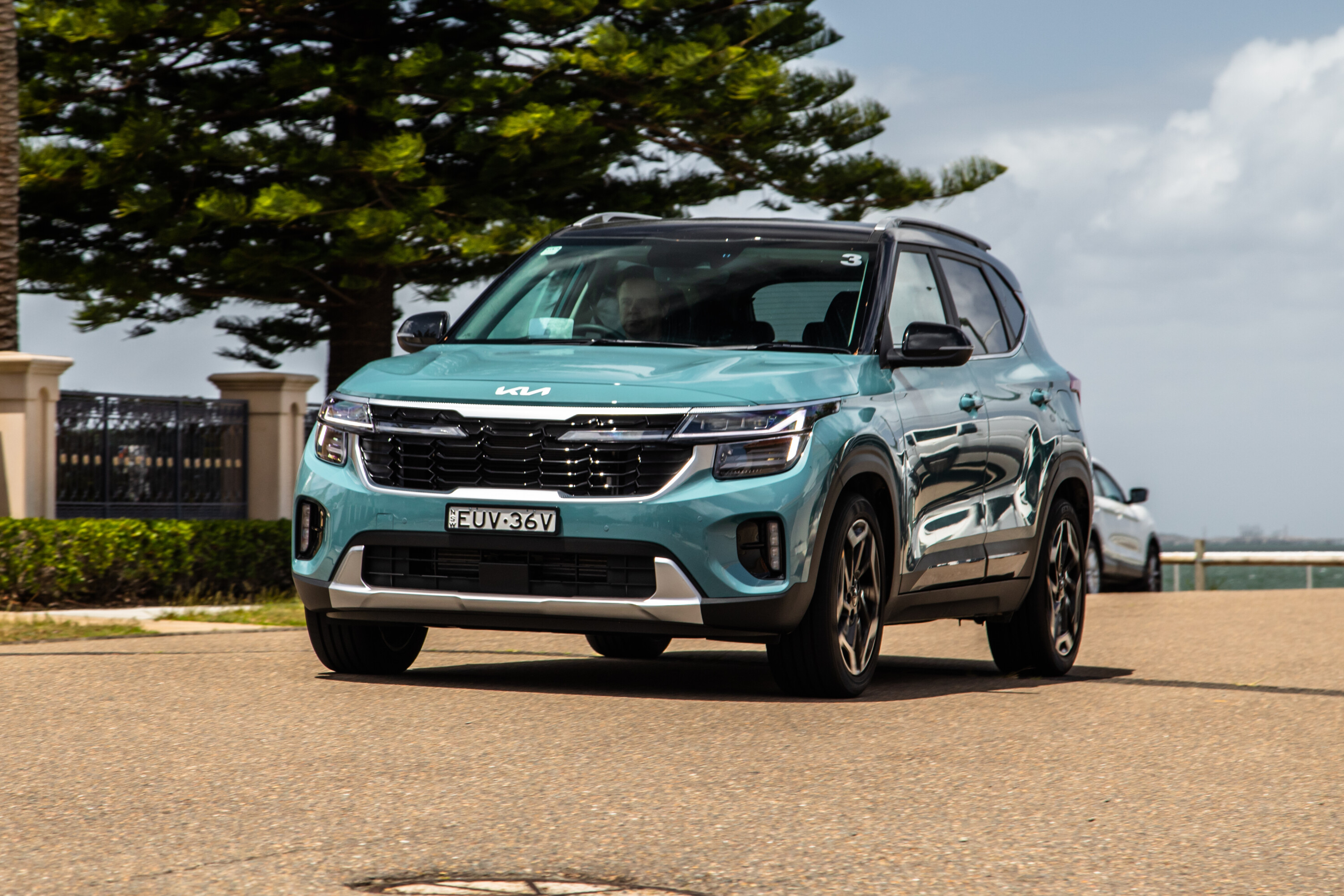
The new car also tips Hyundai into more direct competition with the VW T-Roc, a very accomplished if pricier small SUV.
On the bargain side of the ledger, you could consider an MG ZS but the Kona is better in every way apart from warranty length. The Haval Jolion is slightly bigger and has a lot more equipment but is a long way from the Kona’s more polished demeanour.
The criminally underrated Ford Puma ST-Line is also well in contention against the Kona. While its interior is getting on a little and isn’t as big for passengers, it’s still a very practical and engaging small SUV.
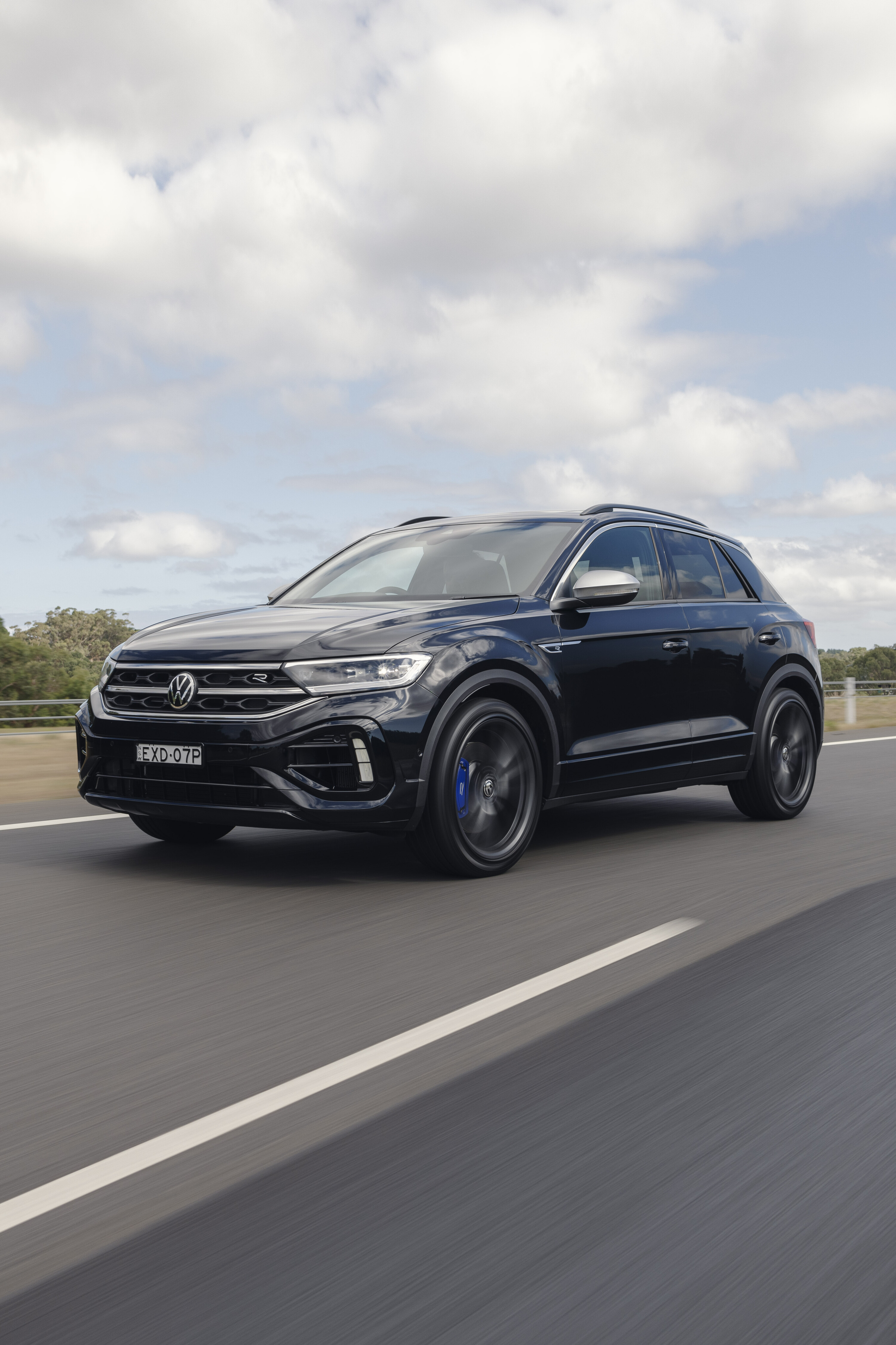
Interior comfort, space and storage
This new Kona now has the space of key rivals, including its cousin, the Kia Seltos.
Now built on the longer wheelbase sedan platform of the i30 rather than the shorter hatch, there is a heck of a lot more room in the Kona. An increase in legroom of 77mm doesn’t sound like much, but it’s a lot – the old car was a bit of a squeeze. The longer wheelbase of the K platform delivers the gains with its 60mm stretch.
I can now fit quite happily behind my driving position (I’m 180cm tall) and still have plenty of knee, leg and foot room. The back seat is slightly more comfortable and there are now standard rear air vents and – wonder of wonders – a centre rear armrest with cup holders.
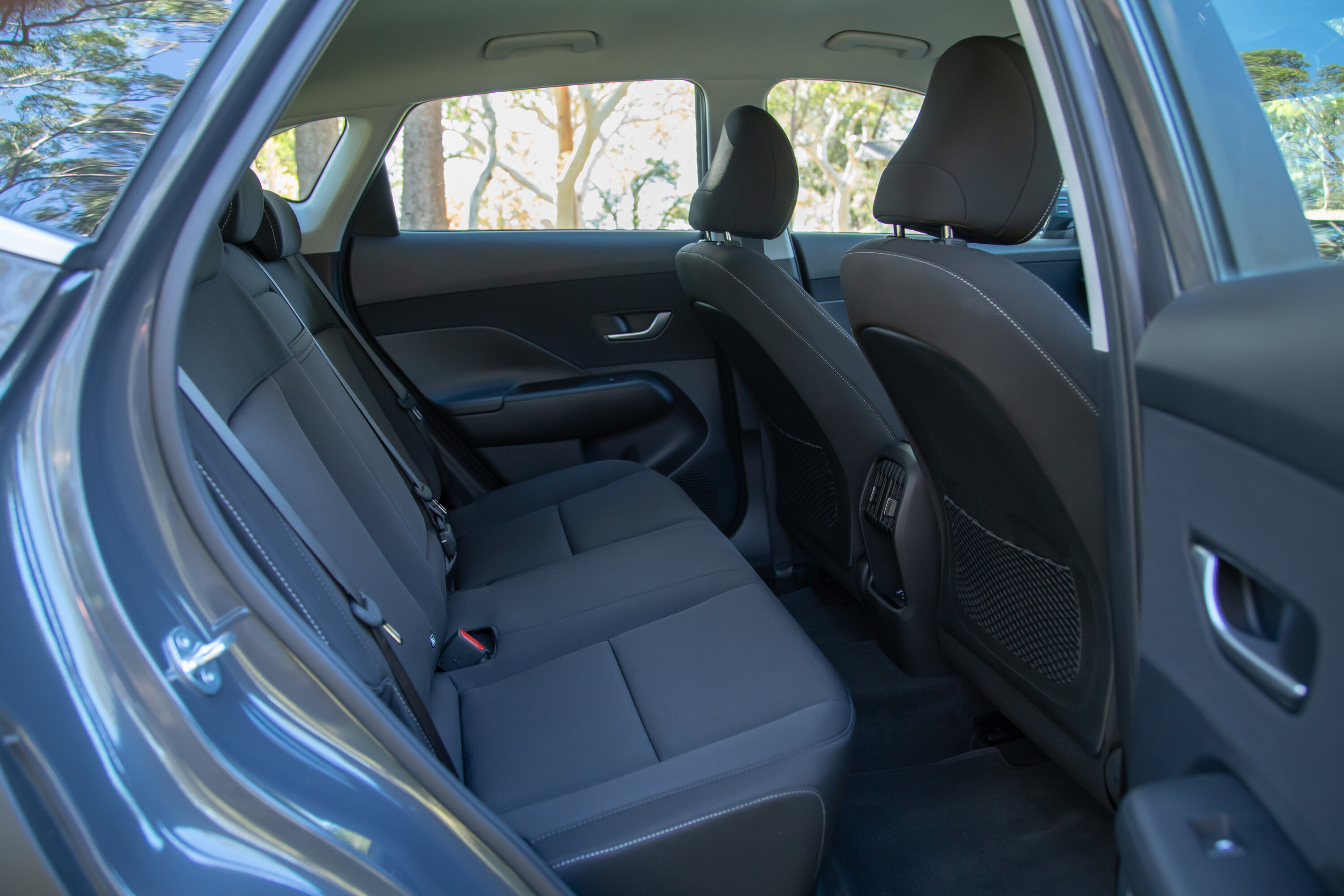
Behind you is a useful increase to 407 litres of cargo space, which is closer to most competitors except the Ssangyong Korando which blows everyone out of the water with 550 litres.
Stepping out of an old Kona and into the new is quite an experience. The dual-screen effect makes the car feel a lot more expensive and tech-heavy, with a 12.3-inch media screen and that deceptively part-digital dashboard. The Citroen influence hasn’t stopped with the second-generation Kona, which features a not-quite-round steering wheel.
Curiously there isn’t a single Hyundai logo to be found in the cabin, or at least not one I could find.
You’ll find a handy little Kluger-style slot carved out of the passenger-side dash, which is a handy spot for phones or odds and ends. The doors also have pretty sizeable pockets and bottle-holding abilities.
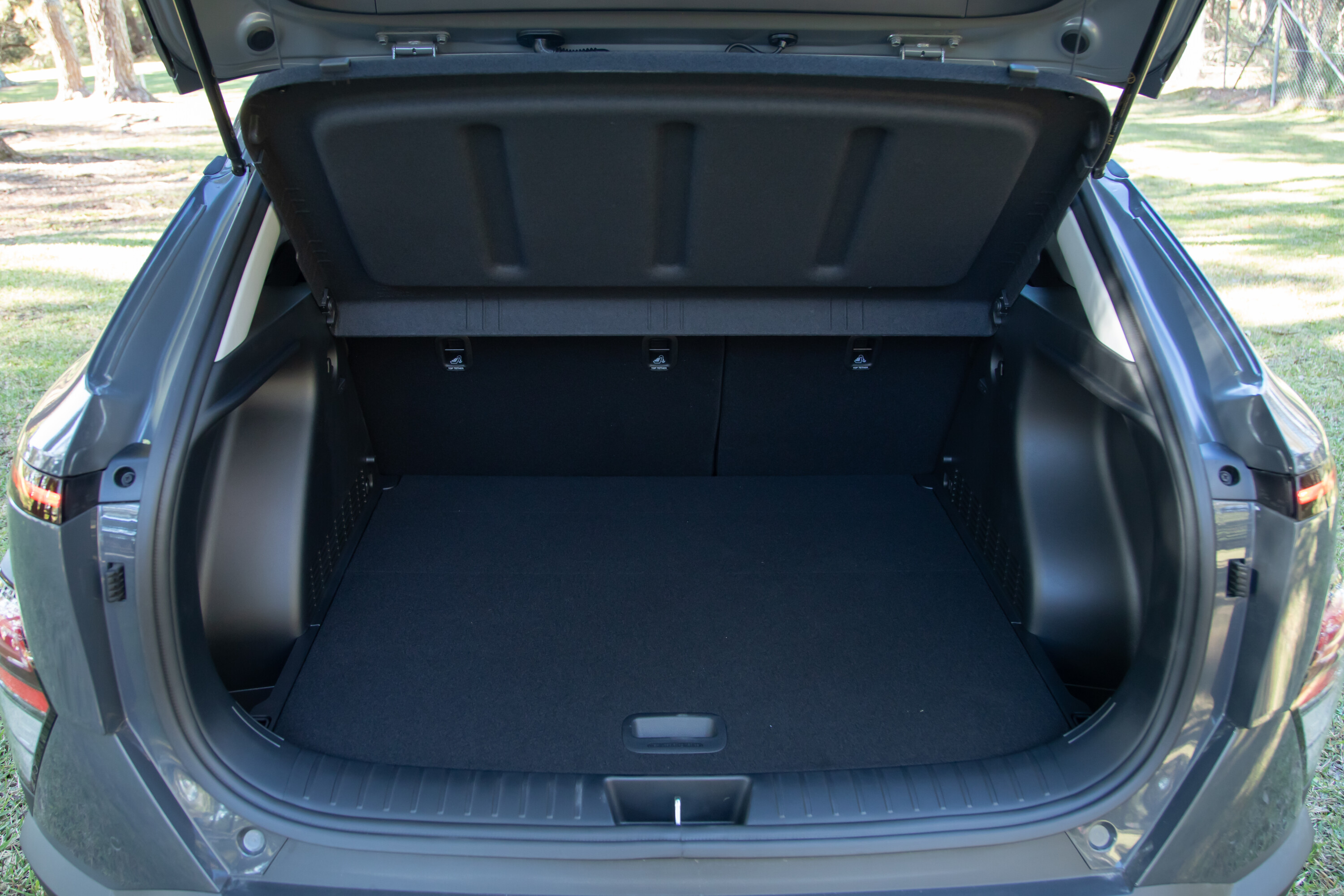
What is it like to drive?
On a quick introductory drive around southern Sydney that took in a variety of road surfaces, types and bendiness, the new Kona feels like a much more polished drive.
It’s probably a little less interesting to drive than the previous car, which enjoyed a firmer set-up on a shorter wheelbase. The new car is more interested in ride comfort but despite the price increase, the turbo-engined cars’ multi-link rear end still hasn’t found its way down to the 2.0-litre cars.
For most of the time, torsion beams at the rear play ball pretty well. Not French well (where did the Citroen influence disappear to?) but pretty good. Once the surface turns into a typical Sydney suburban road, you start to feel it getting a bit busy – especially if you’re in the back.
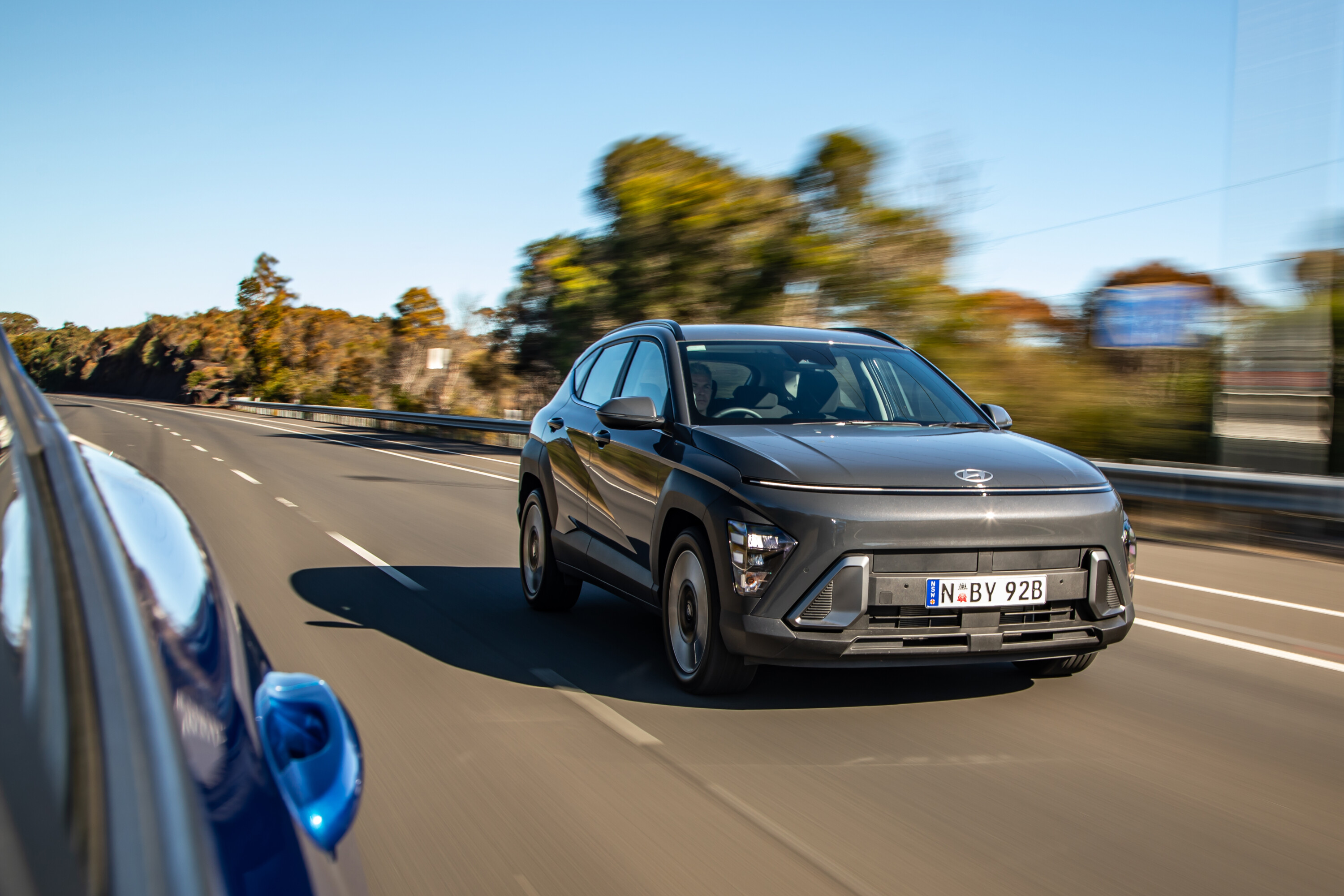
The steering is very light at lower speeds but weights up nicely.
As always, this doesn’t mean much other than a distraction for those passengers but if you’re really pressing on down a country road, it will mean the odd skip or unruly moment. Unruly moments are swiftly dealt with by the array of safety systems so, again, it’s not a drama, just something that needs more work.
The steering is very light at lower speeds but weights up nicely. The overwhelming impression is that the Kona is now quieter, more comfortable and more like the rest of the cars in the segment.
| 2024 Hyundai Kona drivetrain | |
|---|---|
| Drive | front-wheel |
| Engine | 2.0-litre naturally-aspirated four-cylinder petrol |
| Transmission | continuously variable |
| Power | 110kW @ 6200rpm |
| Torque | 180Nm @ 4500rpm |
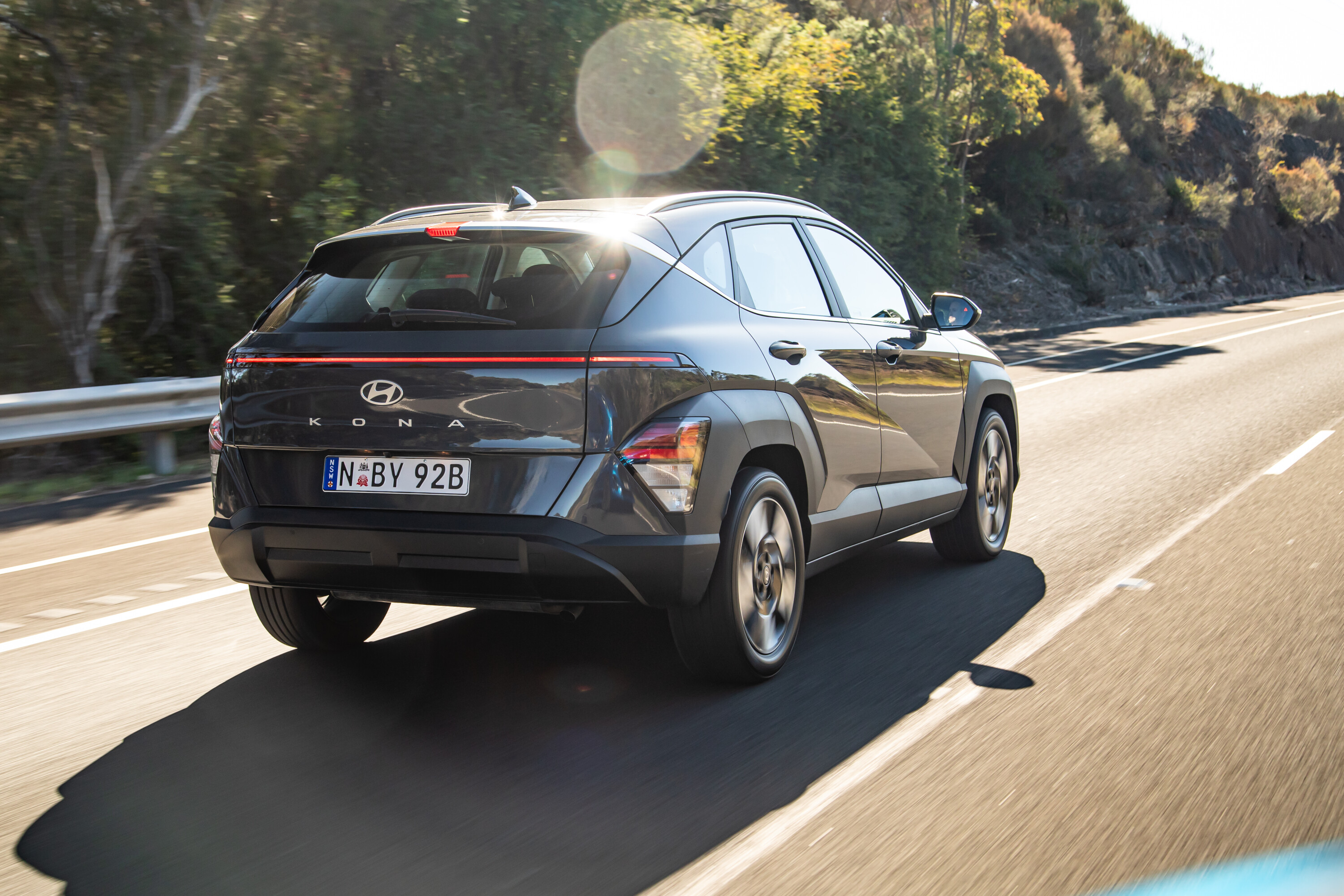
The 2.0-litre engine remains fairly pedestrian with some tweaks to include a fuel-saving Atkinson cycle and variable valve timing on both inlet and exhaust cams.
In concert with an aero trick or two including active flaps instead of a grille (making the car look like its forthcoming EV version), that extra engine tech is said to reduce consumption and improve refinement.
The automatic continuously variable transmission (CVT) seems a little more refined and engaged with the job at hand and even has eight fake ratios programmed in. I had little use for those, though, letting the gearbox instead get on with the job. Again, it’s like the rest of the non-electrified cars in the small SUV market, but quieter than most and very smooth.
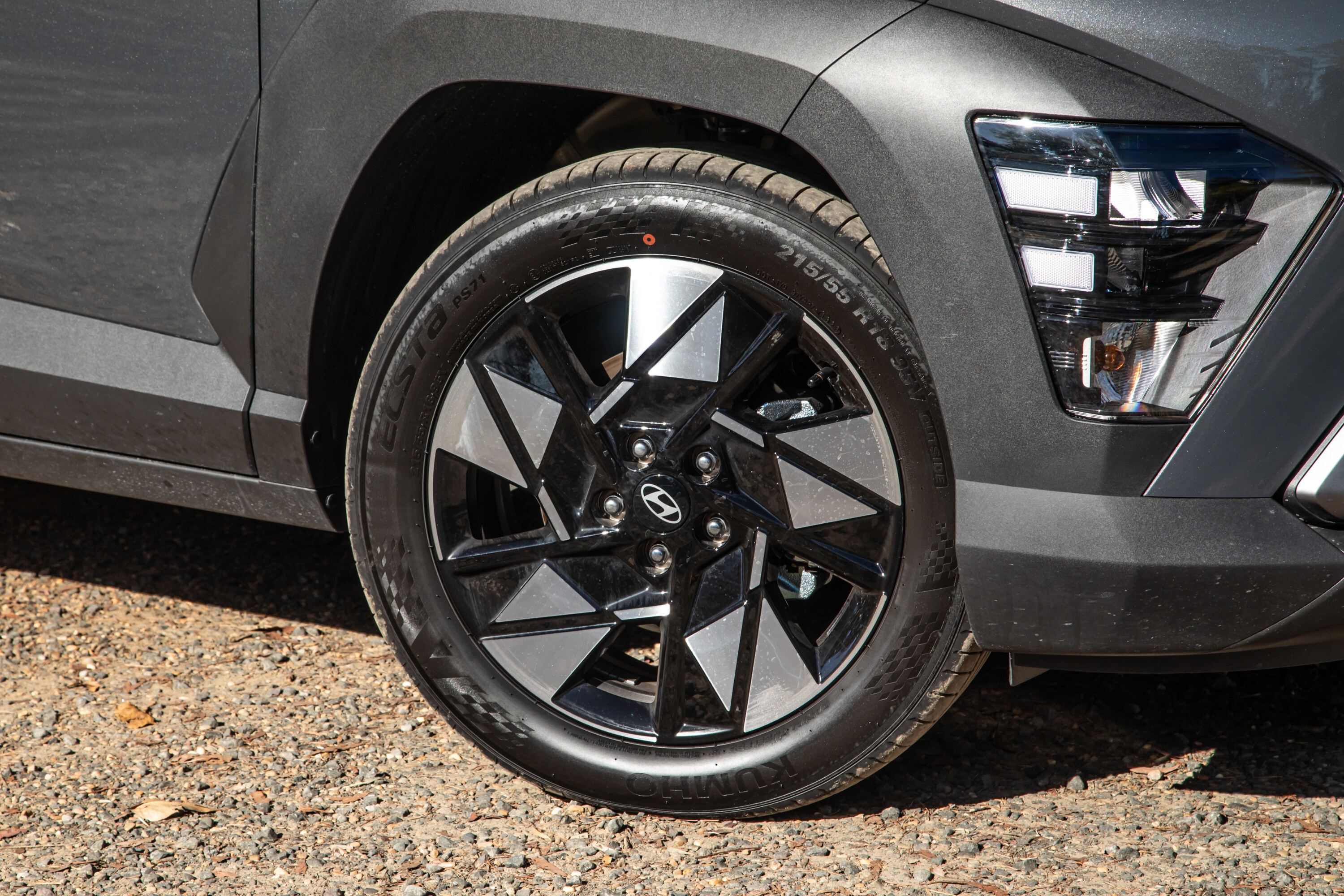
How is it on fuel?
Despite an increase in weight and not much in the way of fuel-saving technologies (still no idle-stop), the new Kona’s fuel average is down by 0.4L/100km to 6.6L/100km.
As this was a fairly frantic day with the Kona, a real-world fuel consumption figure will have to wait for a lengthier test.
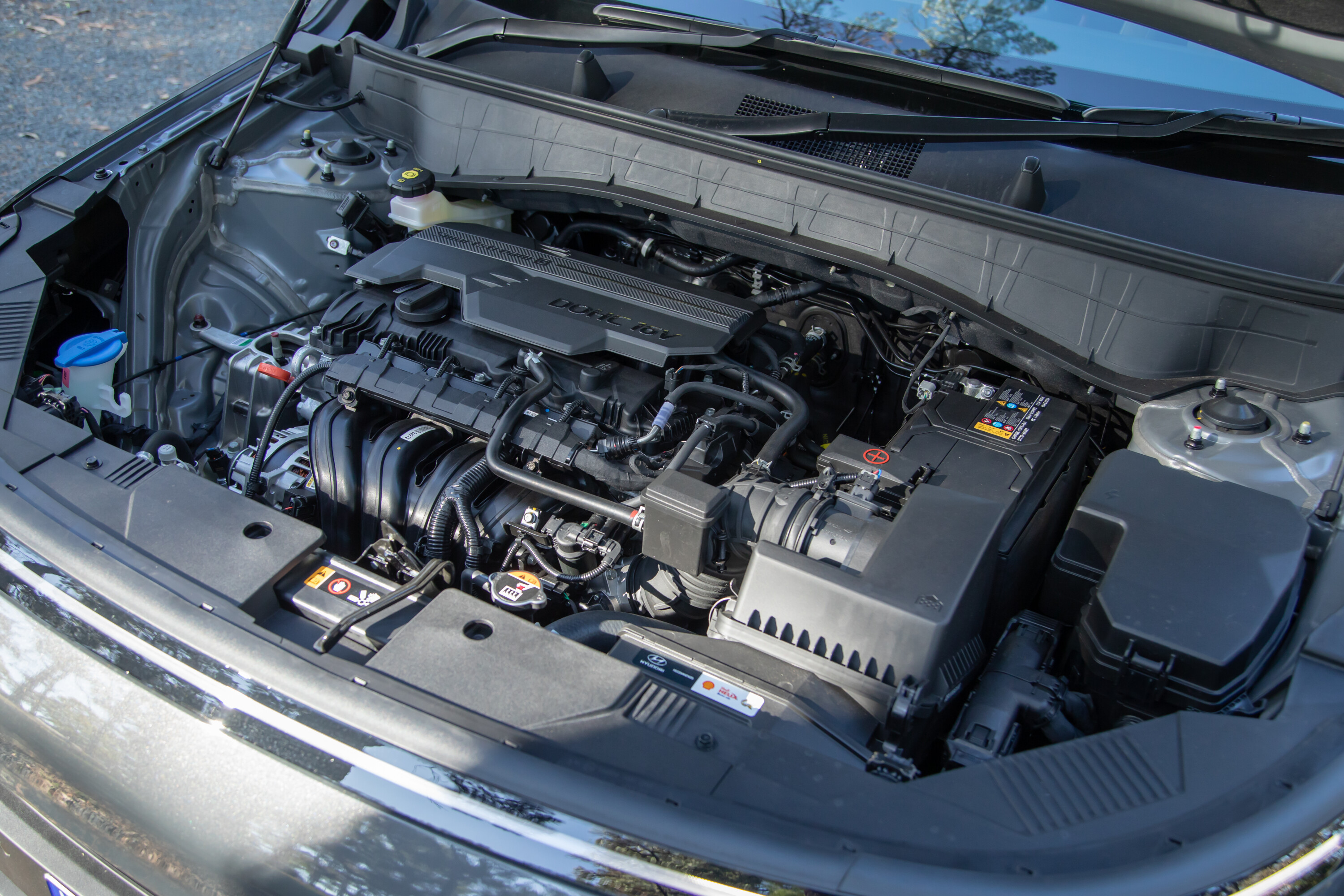
How safe is it?
The 2024 Kona doesn’t yet have an ANCAP safety rating (July 2023)
| 2024 Hyundai Kona safety features | |
|---|---|
| Seven airbags (including driveru2019s knee) | Rear occupant alert |
| Autonomous emergency braking (vehicle, pedestrian, cyclist, motorcycle, junction-turning, direct oncoming) | Traffic sign recognition |
| Lane-keep assist | Intelligent speed limit assist |
| Lane following assist | Driver attention monitoring |
| Blind-spot alert | Driver monitoring camera |
| Rear cross-traffic alert | Leading vehicle departure alert |
| High beam assist | Safe exit warning |
| Adaptive cruise control | |
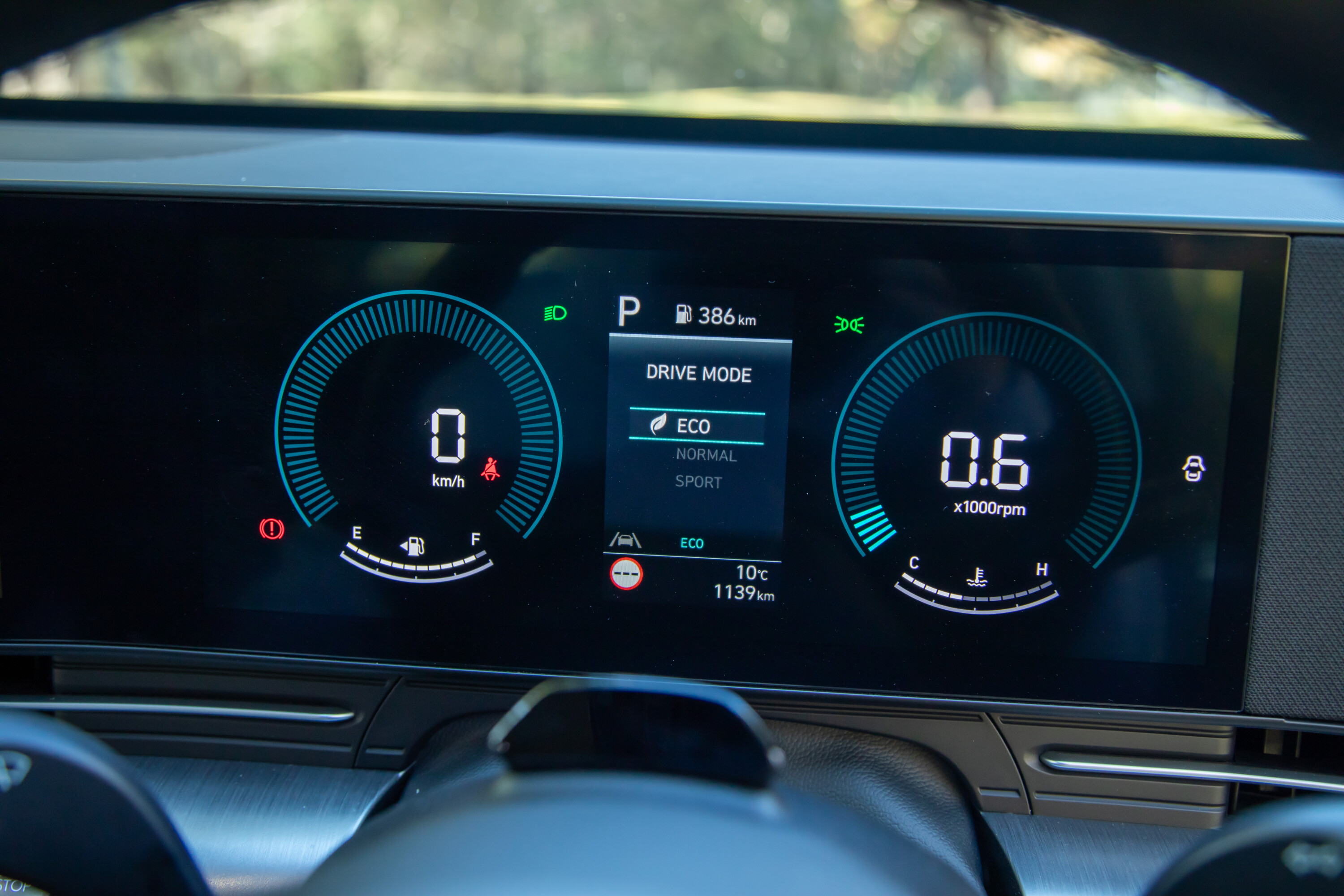
One of the seven airbags is a centre-front airbag which should ensure a five-star rating, all things being equal.
I always wonder why car-makers skip reverse auto emergency braking (AEB) when the rear cross-traffic alert is there – as is the disappointing case with this Kona.
If you want more safety gear, the Premium adds reverse AEB, 360-degree cameras, blind-spot cameras and side parking sensors (on top of a whole lot of other stuff to try and justify the $7000-plus price difference).
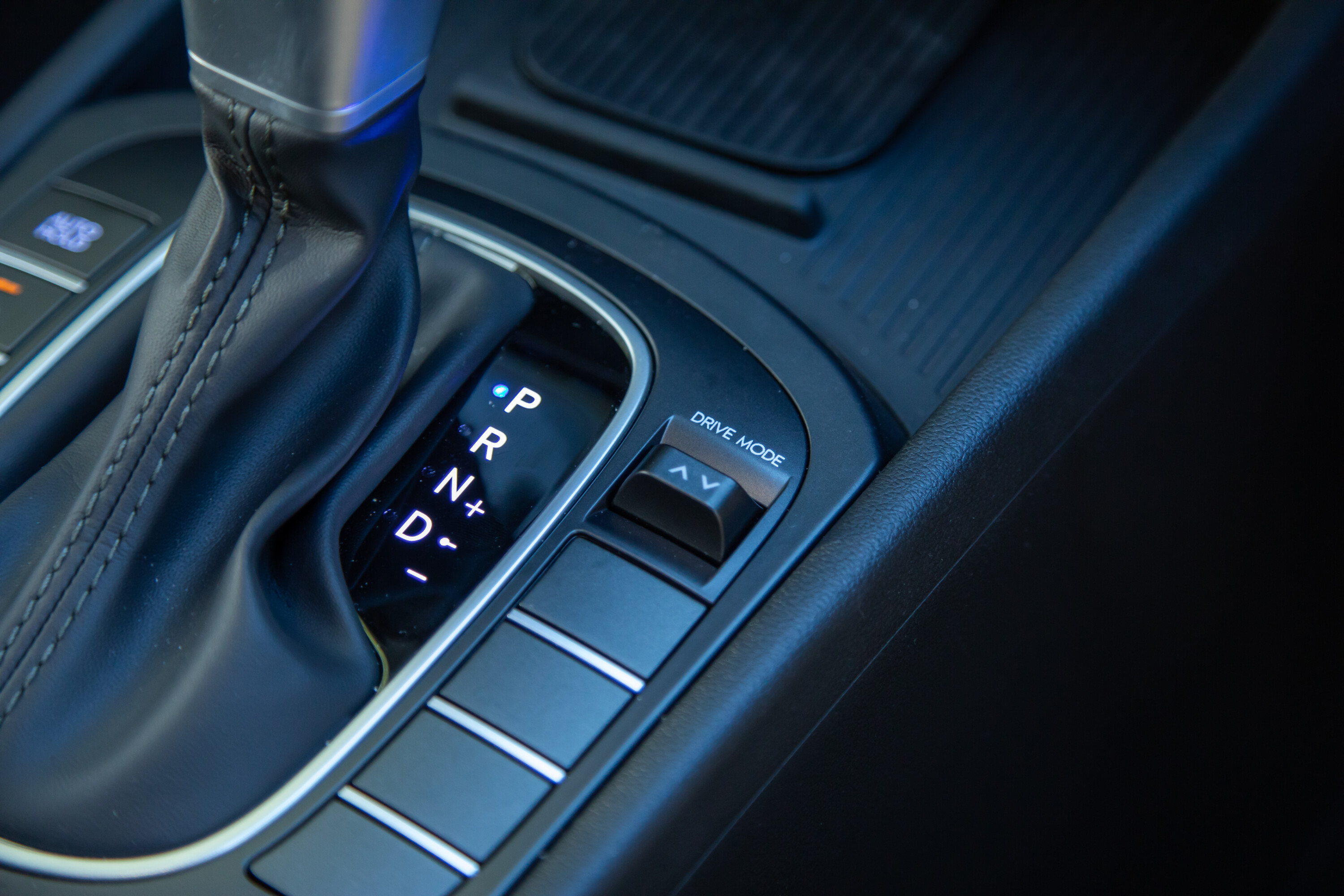
Warranty and running costs
Hyundai offers a five-year/unlimited-kilometre warranty.
Services come around every 12 months/15,000km (10,000km for the 1.6L turbo) and, as always, the company offers a five-year capped price servicing regime as well as a lifetime projection of service costs.
The first five services cost $399 whether you go turbo or stick with the 2.0-litre in the base model, but the turbo’s services are due every 10,000km. It’s not especially cheap but lines up with just about everything apart from the Corolla Cross.
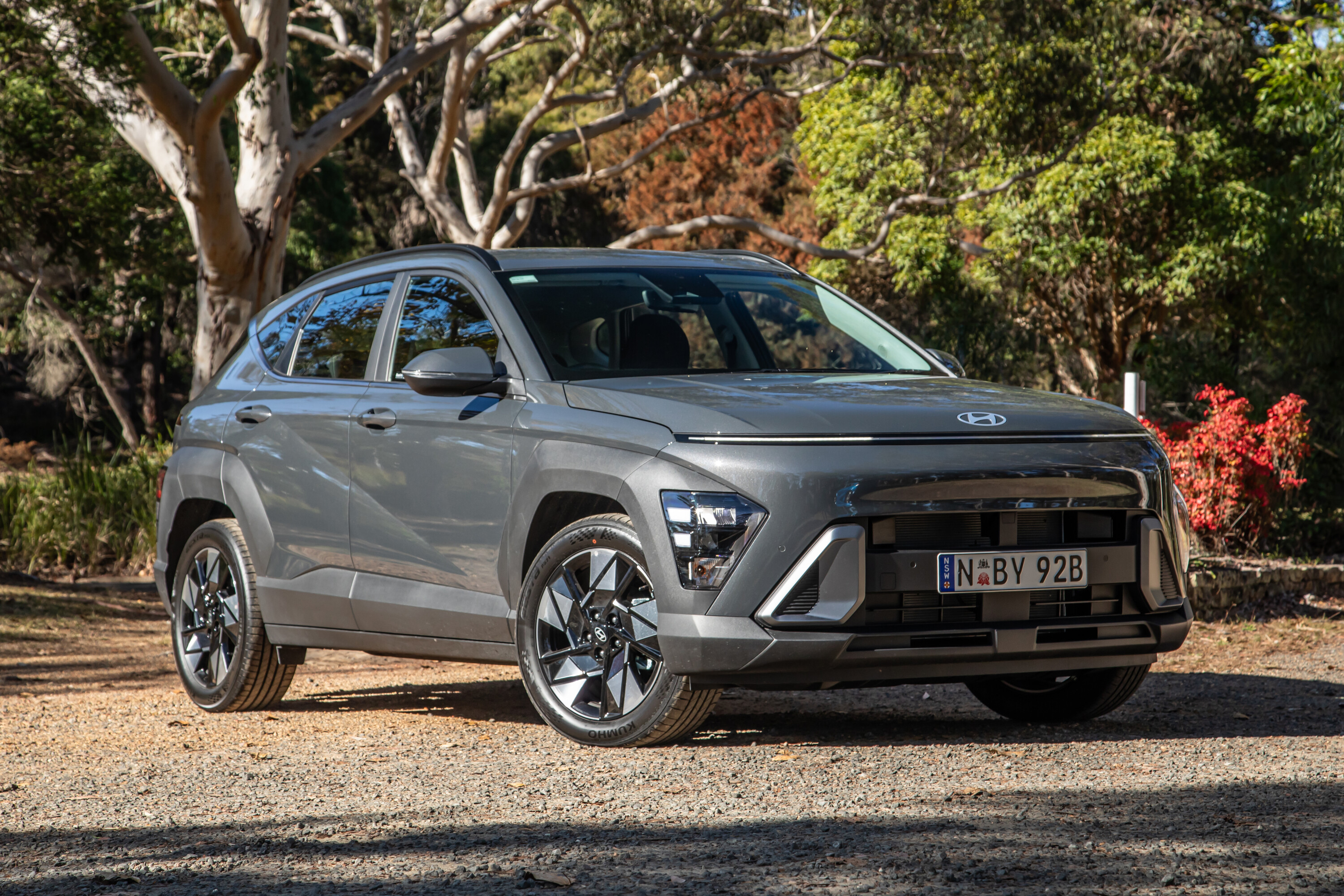
VERDICT
The new Kona is a big jump forward. More space, more tech and more safety – if you pay a bit more.
As a base model, the Kona tested here is very well-equipped and feels well worth the money, even if it’s missing a couple of things I might consider mandatory.
The second-generation Kona has vaulted itself back to the big time – literally.
| 2024 Hyundai Kona specifications | |
|---|---|
| Body | 5-door, 5-seat small SUV |
| Drive | front-wheel |
| Engine | 2.0-litre naturally-aspirated four-cylinder petrol |
| Transmission | continuously variable |
| Power | 110kW @ 6200rpm |
| Torque | 180Nm @ 4500rpm |
| Bore stroke (mm) | 81.0 x 97.0 |
| Compression ratio | 12.5 : 1.0 |
| 0-100km/h | 10 sec (estimate) |
| Fuel consumption | 6.6L/100km (combined) |
| Weight | 1335kg |
| Suspension | MacPherson struts front/torsion beam rear |
| L/W/H | 4350mm/1825mm/1585mm |
| Wheelbase | 2660mm |
| Brakes | 305mm ventilated disc front / 284mm solid disc rear |
| Tyres | 215/55 R18 |
| Wheels | 18-inch alloy wheels (space-saver spare) |
| Price | $32,000 + on-road costs |
Score breakdown
Things we like
- Cool looks inside and out
- Equipment level
- So much more space
Not so much
- Sometimes fidgety rear ride
- Ho-hum drivetrain
- Price increase
We recommend
-
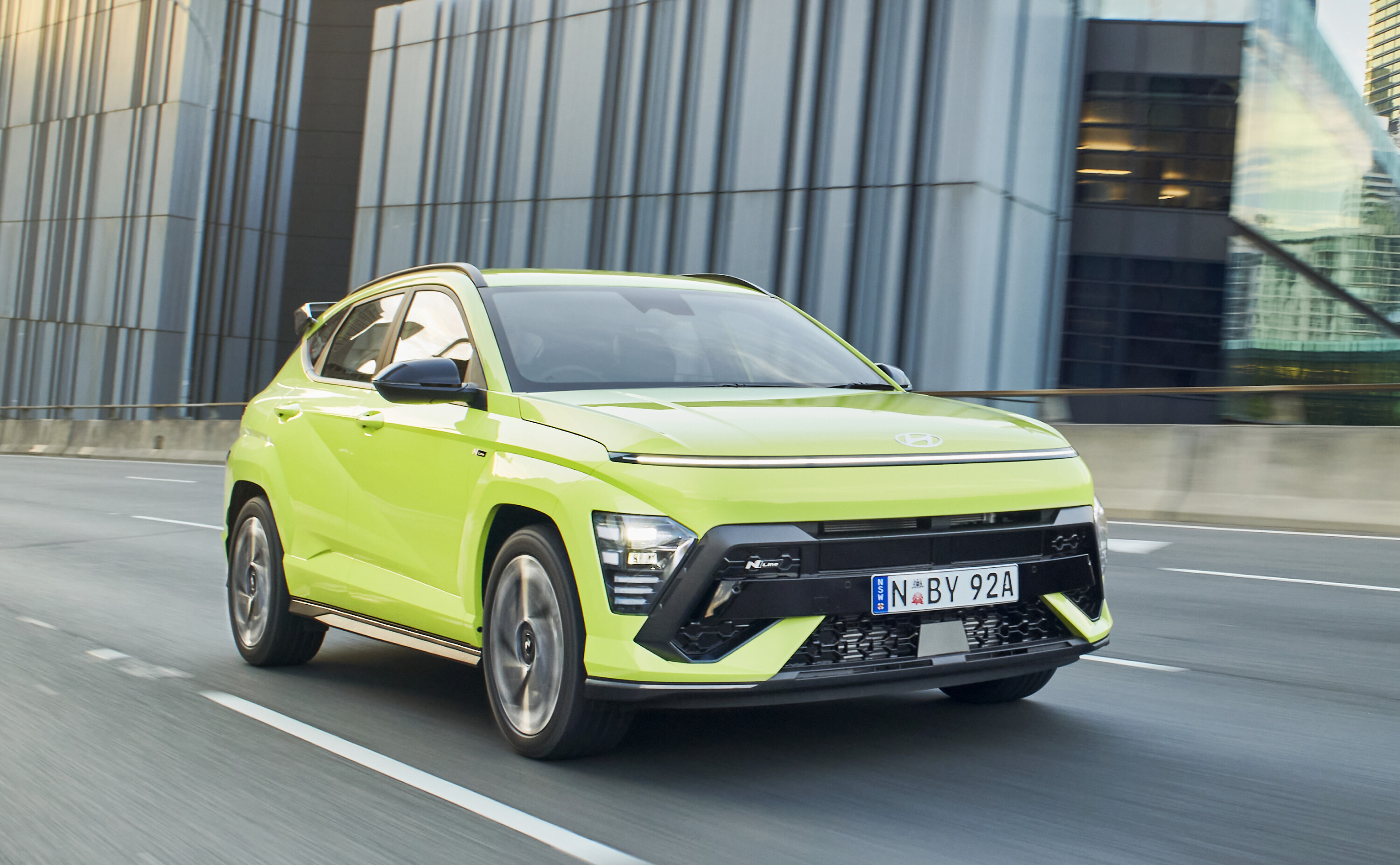 News
News2024 Hyundai Kona pricing and features: Petrol, hybrid, N Line
Hyundai has locked in pricing and features for the second-gen Kona, including the hybrid!
-
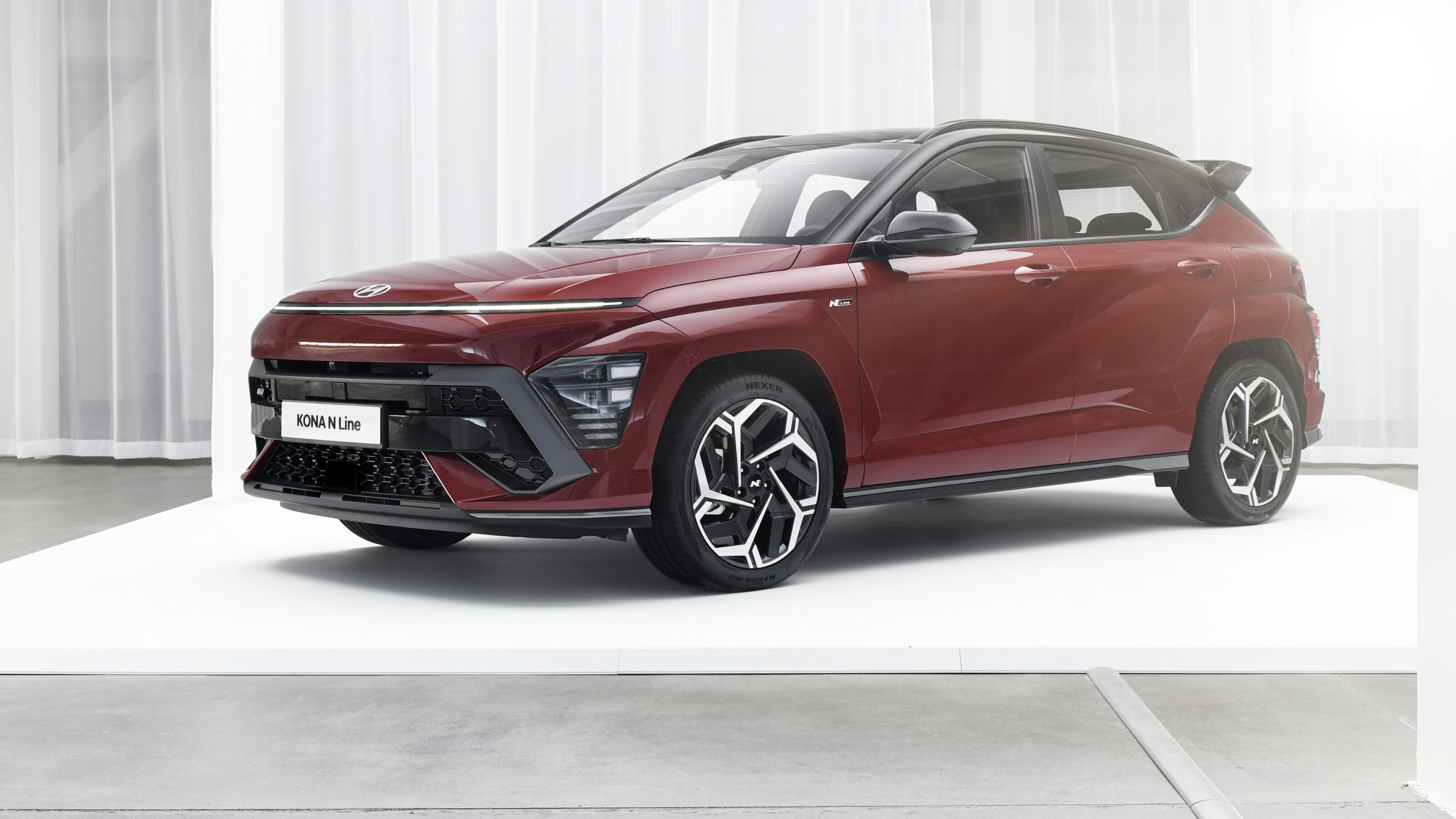 News
NewsVideo: 2024 Hyundai Kona initial Australian details revealed
The second-generation Hyundai Kona will arrive in Australia from mid-year, with two grades across petrol, hybrid and all-electric powertrains
-
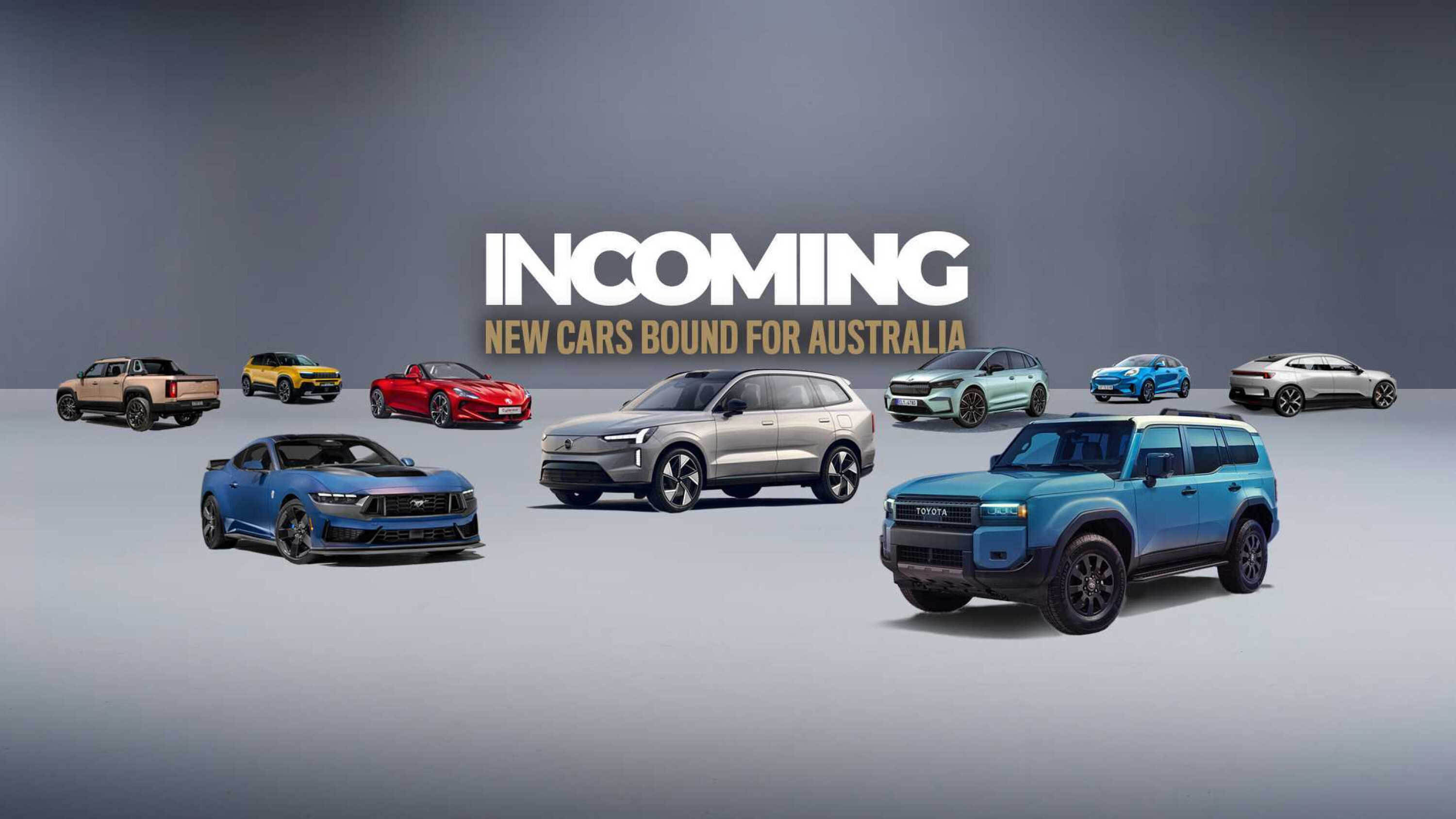 News
News2025 New Car Calendar: All the new cars coming to Australia
Take a look at our list of what is expected to launch in Australia in 2025 – plus those we might not see locally just yet


